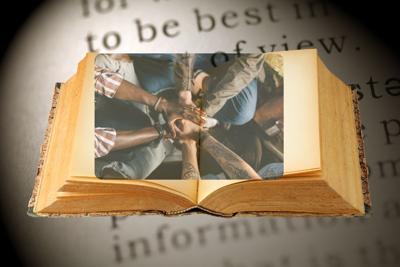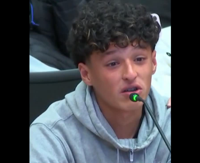
During his first inaugural address, President Bill Clinton said, “There is nothing wrong with America that can’t be cured by what’s right with America.” Of course, there is a lot of policy making and legal interpretation required to truly fix what is wrong with America right now, and we certainly aren’t on the right track, but I think there’s a simple way we can start that will have a ripple effect across every aspect of American society. What we need is storytelling.
As I’ve said before, an infection has spread through America and the only way to stop it is to honestly reconcile with the darkest parts of our nation's past. As we begin to do that, we must also shine a light on some of the greatest stories that we’ve either hidden or misrepresented.
When telling the American story, we generally look to the European influences of our foundation. For example, the Magna Carta is often cited as a major influence and even precursor to the Bill of Rights. While this is true, it is not the only influence our founding fathers considered when authoring the U.S. Constitution.
Have you ever heard of the Haudenosaunee Confederacy? You may have heard them referred to as the First Nations, or maybe Six Nations. They were a powerful group of Iroquois-speaking tribes that lived and traded with one another in harmony as part of a larger democratic society operating under its own constitution called the Great Law of Peace. Many of the ideals present in the Great Law, such as individual liberties and separation of powers, are also found in the U.S. Constitution.
The majority of American heroes are white men. Often, when we learn about our history, it is glorifying white heroes or exposing white villains, with a few notable exceptions. Conversely, when discussing our non-white heroes, we ignore many of their core values and only amplify those that fit a certain image we wish to portray. A perfect example of this is how we generally avoid discussion of Dr. Martin Luther King Jr’s socialist ideals because it makes us uncomfortable, or how our stories of some white heroes like Thomas Jefferson or George Washington ignore or white-wash their characters, like having affairs with slaves who ended up bearing their children or claiming their false teeth were made of wood rather than the teeth of slaves.
We need to start telling the whole story rather than picking and choosing which parts we’re the most comfortable with. We celebrate the violent resistance of our white founding fathers while praising Dr. King for his work toward peaceful resistance and simultaneously pretending he didn’t encourage disruptive activism. We talk about Harriet Tubman, but rarely mention that she had to use violence to rescue slaves and keep the underground railroad running. The Nat Turner rebellion and the work of John Brown are footnotes in our history books that we glaze over. Meanwhile, we have statues erected and name military bases to honor men who chose to secede from the United States rather than subscribe to its most basic principle that “all men are created equal”.
Only recently have we begun to include the Black and Indigenous figures that helped shape the American West, like Bass Reeves, but we generally separate the two, omitting the fact that their stories are one and the same. Many of the Black cowboys who helped shape the American frontier were the offspring of both Black and Indigenous parents, and their stories tie in directly to the enslavement and often harrowing escapes of people of both ethnicities. Black, Indigenous and Latino cowboys were just as heroic and vital to the foundation of the American West as Jesse James and Wyatt Earp.
Speaking of the American West, we all know that Asian American history goes way back to the first railroads and that the transportation system they built connecting the two halves of the nation is one of the most important parts of U.S. history. San Francisco’s Chinatown in is one of the oldest and most important Chinese American enclaves in the U.S. and its foundation is directly linked to the American railroad. But when we talk about the Chinese immigrants who helped build the West, we talk about them as a nameless, faceless group. Most of their names and individual stories are lost to history, and yet one of our most cherished rights - Birthright Citizenship - is explicitly mentioned in the Constitution because of their stories. His name was Wong Kim Ark.
Yes, I meant it when I said that America has an America problem, and I mean it when I say that the only way to fix that problem is with more America. There are so many stories and heroes throughout U.S. history that perfectly exemplify the American spirit, our nation's struggles, and its greatest successes. Unfortunately, when we tell the story of America, we tell it wrong. We warp and shift the narrative to reflect what we believe America is, or what we want it to look like.
As we confront the darkest evils of our past, we must remember to include the complete and complicated stories of its heroes and influences. The stories we ignore are just as integral to our national identity as the stories we choose to tell. So many of the most American stories of them all are altered or buried simply because of the color of the hero’s skin.
The real American story is complex. It’s brutal and heroic. It’s dark but also beautiful. It’s uncomfortable, but full of such greatness. It’s also multicolored and multicultural. Telling the whole story as it really happened doesn’t diminish how amazing the story is or how great this nation can still become. In fact, it only makes it better.
If we want to heal and truly make America great, it’s time we start telling its stories truthfully and completely. The American story is a great story, and it’s a story we all can and should see ourselves reflected in, no matter who we are, what we believe, where we come from or what we look like.
America’s story is all our story.










(0) comments
Welcome to the discussion.
Log In
Keep it Clean. Please avoid obscene, vulgar, lewd, racist or sexually-oriented language.
PLEASE TURN OFF YOUR CAPS LOCK.
Don't Threaten. Threats of harming another person will not be tolerated.
Be Truthful. Don't knowingly lie about anyone or anything.
Be Nice. No racism, sexism or any sort of -ism that is degrading to another person.
Be Proactive. Use the 'Report' link on each comment to let us know of abusive posts.
Share with Us. We'd love to hear eyewitness accounts, the history behind an article.